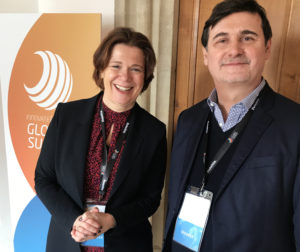Unleashing the Power of BaaS and Data-driven Liquidity.
As interest rates continue to rise, the working capital challenge is brought into sharp focus for both SMEs and corporates. For the SME market, the ability to access credit efficiently and seamlessly has become a vital requirement in sustaining the business. For corporates, maximizing working capital efficiency has become a source of considerable competitive advantage. While traditional banks have long been the go-to source for business financing, their restrictive lending practices and legacy technology often limit SME and corporate customers from accessing the funds they need in a timely fashion and put a brake on working capital optimization, stalling business objectives and growth.
However, with the emergence of Banking-as-a-Service (BaaS) providers and the innovative concept of embedding credit into B2B payment flows, a new era of financial empowerment has dawned.
The Power of Embedding Credit
Whilst embedded payments and financing have changed the B2C experience over the last few years, embedding the more complex payment and credit flows into B2B businesses is still at an early stage, complicated by the requirement to work with a range of accounting, ERP, and treasury management systems. The opportunity to revolutionize B2B payment flows, however, means that the opportunity is significant. BaaS technology companies, such as Bankable, are at the forefront of this financial transformation. By integrating alternative credit offerings directly into their proprietary B2B payment infrastructure, they enable businesses to leverage unlimited credit as a strategic tool to optimize cash flow and seize growth opportunities. All accessed through simple plug-and-play API connectivity.
One of the key USPs of embedding credit into B2B payment flows is the ability to provide bespoke financing products. Traditional banks often rely on underwriting methods that fail to capture the true potential of SMEs based on their historic accounting or real-time financial data. With its recent acquisition of AREX Markets, Bankable’s technology has the power to analyze a vast array of data points to assess creditworthiness accurately. This data-driven approach ensures that credit products are designed to cater to the specific needs of businesses, empowering them to access the optimum amount of liquidity required for growth.
Equally as challenging in the large corporate space is the lack of flexibility in accessing credit. Traditional providers take a rather fixed approach to approving and provisioning credit via solutions such as revolving credit facilities which incur cost and time just to set up. The new generation of BaaS providers can be far more dynamic in approving and provisioning the right amount of funds, at the point of need, thus minimizing costs and maximizing the working capital efficiency.
By integrating financing into the payment process, businesses can access immediate liquidity and bridge the gap between payables and receivables through invoice or purchase order financing. This enables companies to maintain a healthy cash flow, facilitating timely payments to suppliers and enabling them to seize new growth opportunities.
Seamless Integration with Payment Flows
By seamlessly integrating credit offerings and liquidity options into B2B payment flows, BaaS providers eliminate the need for businesses to navigate multiple platforms and lengthy loan application processes. This streamlined approach allows companies to access credit at the moment they need it most, without disrupting their day-to-day operations. Whether it’s bridging short-term cash flow gaps or investing in expansion plans, the ability to access credit on-demand is a game-changer for SMEs and corporates.
The BaaS market has witnessed tremendous growth in recent years, driven by the increasing demand for flexible financial solutions. Traditional banks now have the power to better serve their SME and corporate customer by leveraging BaaS providers for their unique credit offerings, and ability around time to market for new solutions. Furthermore, the growing ecosystem of BaaS providers is fostering competition and innovation, resulting in better products and services for businesses.
While the BaaS credit market is still in its early stages, its potential is undeniable. As more companies recognize the advantages of embedding credit into B2B payment flows, the market is poised for rapid expansion. However, to truly unlock the potential of credit products for businesses, the focus must remain on leveraging data to drive liquidity.
The Future of BaaS
The integration of financing options such as credit into B2B payment flows is revolutionizing the financial landscape for businesses, and BaaS providers like Bankable are leading the pack. By leveraging data-driven insights derived from accounting and payment data, Bankable can offer complementary credit products tailored to the specific needs of both small SMEs and large corporates alike. This approach empowers businesses to access the liquidity they need to fuel growth and seize opportunities whilst simultaneously empowering banks and other enterprise platforms to better service more of their customers.
It is crucial for the financial industry to recognize that true credit products should be designed to embrace the unique challenges faced by SMEs. By harnessing the power of data, BaaS providers can bridge the gap between the underserved SMEs and the credit they deserve. It is time for a new era of inclusive BaaS and credit solutions that empower smaller businesses to thrive, and BaaS is at the forefront of making that a reality.
As the financial landscape continues to evolve, the integration of credit into B2B payment flows offers a promising path towards a more inclusive and efficient financial ecosystem, where all businesses have access to the credit they deserve.
About Bankable
Bankable is a global architect of innovative payment solutions enabling Banking as a Service. We enable and serve dominant financial institutions, corporates, and FinTech entrepreneurs to bring to market highly differentiated payment solutions supported by a very strong, immediate business case. Bankable is a founding member of Innovate Finance.

